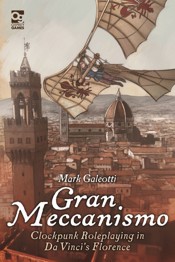Gran Meccanismo: Clockpunk Roleplaying in Da Vinci’s Florence

This is a role-playing game rulebook. I love to read these, I think because I love to put rules around domains of information, and there’s nothing as amorphous as life itself.
(Maybe read this: Are Computers Just Really Expensive Dice?)
The setting is Florence, Italy of the Italian Renaissance – the late 1400s and early 1500s. The time of Leonardo Da Vinci (1452-1519). But the trick is that it’s a world where all of Da Vinci’s ideas worked – there are gliders, and “water-powered computers,” and all sorts of other stuff that Da Vinci theorized about in his notebooks, but that never actually got built.
Gran Meccanismo is a roleplaying game of swashbuckling adventure in a Renaissance Italy where Florence’s winding alleys play host to spies, scholars, and sell-swords alike. Players are nobles, mercenaries, inventors, and artisans who may find themselves crossing wits with Machiavelli, avoiding the dangerous charms of Lucretia Borgia, or hearing Christopher Columbus telling tales of the new world he has discovered…
I like the premise – kind of like “steampunk,” but 350 years earlier.
The game itself is very interpretive. The rules are slim – there are only three character attributes, and there are skills that you can pretty much just make up. There are no character classes, but rather archetypes of things like doctor, merchant, assassin, entertainer, etc.
What it seems like is that some people created a fun roleplaying game for themselves, and decided to generalize the rules for everyone. The problem is that there doesn’t seem to much supporting information.
I couldn’t find any adventure module, for example. And the setting is a hard one to do anything ad hoc. I feel like it doesn’t lend itself to simple hack-and-slash, but is much more tilted towards intrigue and complexity. I feel like coming up with interesting plots here would be difficult.
And the rules are “loose.” A lot of the rules depend on good, experienced players and a respected “guide.” In many cases, you just make stuff up. You have to decide what requires a role, and how many rolls it would require, and what skills come to bear on it, etc. All of this is very interpretative.
So, again, love the concept, loved the artwork, enjoyed reading about it. But I I think it would be a hard game to actually play well.
Book Info
- I have read this book. According to my records, I completed it on .
- A hardcover copy of this book is currently in my home library.
Here are some notes I took on the acquisition of this book:
I bought this at The Science Fiction Bookstore in Old Town Stockholm.